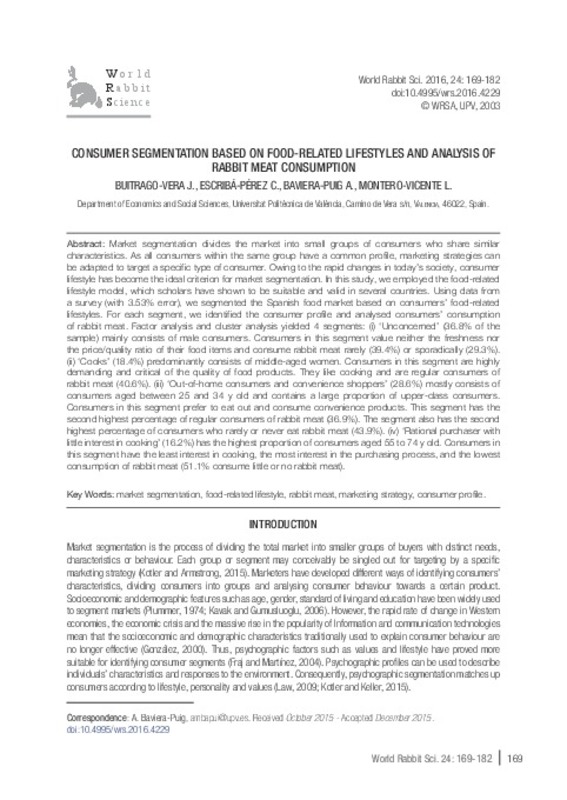JavaScript is disabled for your browser. Some features of this site may not work without it.
Buscar en RiuNet
Listar
Mi cuenta
Estadísticas
Ayuda RiuNet
Admin. UPV
Consumer segmentation based on food-related lifestyles and analysis of rabbit meat consumption
Mostrar el registro sencillo del ítem
Ficheros en el ítem
| dc.contributor.author | Buitrago Vera, Juan Manuel
|
es_ES |
| dc.contributor.author | Escribá Pérez, Carmen
|
es_ES |
| dc.contributor.author | Baviera Puig, Maria Amparo
|
es_ES |
| dc.contributor.author | Montero-Vicente, L.
|
es_ES |
| dc.date.accessioned | 2016-09-30T13:02:24Z | |
| dc.date.available | 2016-09-30T13:02:24Z | |
| dc.date.issued | 2016-09-28 | |
| dc.identifier.issn | 1257-5011 | |
| dc.identifier.uri | http://hdl.handle.net/10251/70841 | |
| dc.description.abstract | [EN] Market segmentation divides the market into small groups of consumers who share similar characteristics. As all consumers within the same group have a common profile, marketing strategies can be adapted to target a specific type of consumer. Owing to the rapid changes in today’s society, consumer lifestyle has become the ideal criterion for market segmentation. In this study, we employed the food-related lifestyle model, which scholars have shown to be suitable and valid in several countries. Using data from a survey (with 3.53% error), we segmented the Spanish food market based on consumers’ food-related lifestyles. For each segment, we identified the consumer profile and analysed consumers’ consumption of rabbit meat. Factor analysis and cluster analysis yielded 4 segments: (i) ‘Unconcerned’ (36.8% of the sample) mainly consists of male consumers. Consumers in this segment value neither the freshness nor the price/quality ratio of their food items and consume rabbit meat rarely (39.4%) or sporadically (29.3%). (ii) ‘Cooks’ (18.4%) predominantly consists of middle-aged women. Consumers in this segment are highly demanding and critical of the quality of food products. They like cooking and are regular consumers of rabbit meat (40.6%). (iii) ‘Out-of-home consumers and convenience shoppers’ (28.6%) mostly consists of consumers aged between 25 and 34 y old and contains a large proportion of upper-class consumers. Consumers in this segment prefer to eat out and consume convenience products. This segment has the second highest percentage of regular consumers of rabbit meat (36.9%). The segment also has the second highest percentage of consumers who rarely or never eat rabbit meat (43.9%). (iv) ‘Rational purchaser with little interest in cooking’ (16.2%) has the highest proportion of consumers aged 55 to 74 y old. Consumers in this segment have the least interest in cooking, the most interest in the purchasing process, and the lowest consumption of rabbit meat (51.1% consume little or no rabbit meat). | es_ES |
| dc.description.sponsorship | The authors thank the Spanish Interprofessional Organization to Promote Rabbit Sector (INTERCUN) for its support in the research | en_EN |
| dc.language | Inglés | es_ES |
| dc.publisher | Universitat Politècnica de València | |
| dc.relation.ispartof | World Rabbit Science | |
| dc.rights | Reserva de todos los derechos | es_ES |
| dc.subject | Market segmentation | es_ES |
| dc.subject | Food-related lifestyle | es_ES |
| dc.subject | Rabbit meat | es_ES |
| dc.subject | Marketing strategy | es_ES |
| dc.subject | Consumer profile | es_ES |
| dc.title | Consumer segmentation based on food-related lifestyles and analysis of rabbit meat consumption | es_ES |
| dc.type | Artículo | es_ES |
| dc.date.updated | 2016-09-30T12:40:13Z | |
| dc.identifier.doi | 10.4995/wrs.2016.4229 | |
| dc.rights.accessRights | Abierto | es_ES |
| dc.contributor.affiliation | Universitat Politècnica de València. Facultad de Administración y Dirección de Empresas - Facultat d'Administració i Direcció d'Empreses | es_ES |
| dc.contributor.affiliation | Universitat Politècnica de València. Departamento de Economía y Ciencias Sociales - Departament d'Economia i Ciències Socials | es_ES |
| dc.contributor.affiliation | Universitat Politècnica de València. Escuela Técnica Superior de Ingeniería Agronómica y del Medio Natural - Escola Tècnica Superior d'Enginyeria Agronòmica i del Medi Natural | es_ES |
| dc.description.bibliographicCitation | Buitrago Vera, JM.; Escribá Pérez, C.; Baviera Puig, MA.; Montero-Vicente, L. (2016). Consumer segmentation based on food-related lifestyles and analysis of rabbit meat consumption. World Rabbit Science. 24(3):169-182. https://doi.org/10.4995/wrs.2016.4229 | es_ES |
| dc.description.accrualMethod | SWORD | es_ES |
| dc.relation.publisherversion | https://doi.org/10.4995/wrs.2016.4229 | es_ES |
| dc.description.upvformatpinicio | 169 | es_ES |
| dc.description.upvformatpfin | 182 | es_ES |
| dc.type.version | info:eu-repo/semantics/publishedVersion | es_ES |
| dc.description.volume | 24 | |
| dc.description.issue | 3 | |
| dc.identifier.eissn | 1989-8886 | |
| dc.contributor.funder | Organización Interprofesional para Impulsar el Sector Cunícola |








